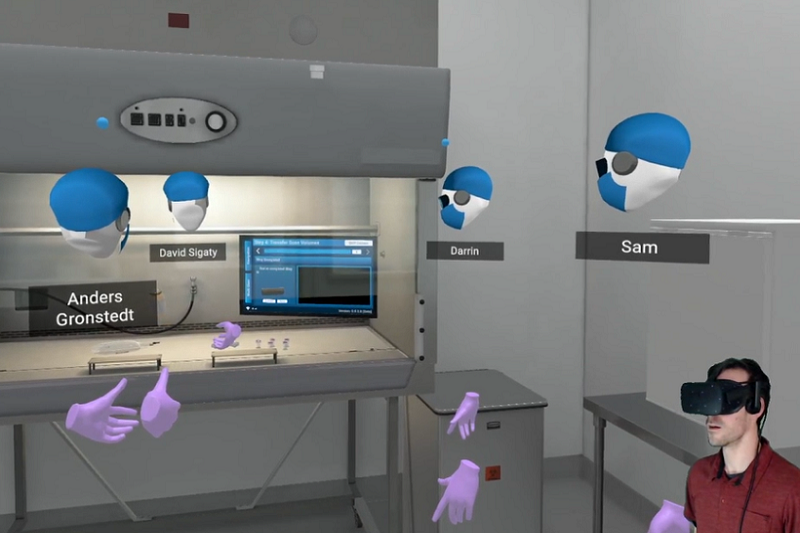ATD Blog
VR Learning in 2023: Stop Dabbling, Get Serious
Wed Feb 01 2023

As we enter a new year, virtual reality (VR) learning has become an undeniable reality. Affordable headsets and sizzling game engines allow students to simulate real-world work scenarios and collaborate with peers and mentors.
The biggest obstacles to widespread VR learning adoption are learning organizations. Many are experimenting with ill-conceived pilot programs without a plan for enterprise-wide transformation. A 360-degree video tour of a factory is a common pilot project that provides incremental gains at best. Watching a spherical video in a VR headset has many of the same limitations as watching a rectangular video on a PC screen; you’re stuck in the camera position, clicking on hot spots and answering multiple-choice questions. Video might be cheaper to produce, but computer-generated environments offer hands-on skills practice. Meanwhile, other organizations try replicating meetings with 2D whiteboards and sticky notes, without leveraging the 3D experience of walking around the shop floor or interacting with products from all angles. These pilot programs are frequently too small and unimaginative to scale up and be transformative.
Piloting is a time-honored approach to innovation, but only if it’s based on a vision of how VR can uniquely address critical business issues with a measurable return on investment. Learning organizations need to stop dabbling with VR solutions looking for problems. Instead of shoehorning e-learning and Zoom meetings into a VR experience, they need to partner with business leaders, professional VR developers, and IT organizations to pilot ambitious VR solutions that will fundamentally reimagine enterprise learning.
Partner With Business Leaders
Takeda, Novartis, and Bristol Myers Squibb are great examples of companies with strategic plans and serious budget commitments to scale VR across the enterprise from the outset. These pharma leaders started their VR implementations in cell and gene therapy manufacturing. Unlike traditional pharma manufacturing (pills), the burgeoning fields of cell and gene therapy manufacturing are highly customized and labor-intensive processes that can drive up the cost of a single patient treatment to half a million dollars. Onboarding new operators without taking physical lab space or subject matter experts away from production is a billion-dollar challenge.
The learning organizations at Takeda, Novartis, and Bristol Myers Squibb partnered with their business leaders to create virtual lab environments where new operators can practice and hone their skills. They also use them for ongoing recertification. Like airline pilots practicing emergency landings in a flight simulator every nine months, cell therapy lab operators can now regularly practice responses to accidents and emergencies. These industry leaders empower their people to move seamlessly, in the flow of work, from the workplace to a pixelated practice space where they can build muscle memory and mastery in the presence of peers and mentors. They began their pilot projects with a plan to scale up and save training costs while improving operator performance, which translates to saved lives.
Partner With VR Developers
Building an in-house team that marries the artistic and technical sides of VR development can be both expensive and time consuming. Recognizing this, Takeda, Novartis, and Bristol Myers Squibb turned to my firm, the Gronstedt Group, to jump-start their VR initiatives. Together, we worked closely with their internal instructional designers and subject matter experts to create 3D virtual replicas of their laboratory environments. This 3D asset library is infinitely malleable for future training, recruitment, certification, and collaboration activities.
Partner With IT Organizations
Deploying VR at scale that’s integrated with existing technology infrastructure requires the early involvement of the IT organization. We helped our clients implement single sign-on and learning management system (LMS) reporting with their IT departments during their pilot stages. One of the companies is a beta tester of Meta Quest for business, which offers the same admin and security capabilities for managing VR headsets and content remotely as you would expect from PCs and mobile devices. The service will be launched this year with Microsoft’s Windows, Teams, Intune, and Azure Active Directory. The backing of these tech giants will make the support from your IT colleagues much easier.
Learning Metaverse
The nascent learning metaverse is breaking down the barriers between the physical and digital worlds with virtual rehearsal studios that provide intense, deliberate practice at the edge of users’ comfort zones and feedback loops to hone skills. Students and instructors can collaborate on tasks, working shoulder-to-shoulder, just like in real life, learning with and from each other in the performance environment. Harnessing this technology requires commitment, so stop dabbling and get serious about VR.
You've Reached ATD Member-only Content
Become an ATD member to continue
Already a member?Sign In
